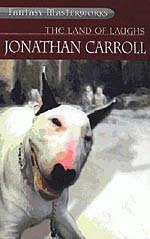
![]() thrak
thrak
11/10/2013
![]()
"Reading a book, for me at least, is like travelling in someone else's world. If it's a good book, then you feel comfortable and yet anxious to see what's going to happen to you there, what'll be around the next corner. But if it's a lousy book, then it's like going through Secaucus, New Jersey - it smells and you wish you weren't there, but since you've started the trip, you roll up the windows and breathe through your mouth until you're done."
The act of writing is akin to that of creation. The author creates whole characters, settings, and if they write SF or Fantasy, whole worlds out of the ether. But because the writer is creating a work of fiction, and not living, breathing people, their responsibility to their art is somewhat different from, say, Dr Frankenstein's shunned responsibility to his monster. If the characters from A Song Of Ice And Fire were real people, we'd have to try George R R Martin for war crimes. In 'The Land of Laughs', Jonathan Carroll explores the difference between these two responsibilities, and what would happen if they somehow started to merge.
Schoolteacher Thomas Abbey's life is in a rut, so he decides to take a break from his work to write the biographer of his favourite author, Marshall France, legendary writer of children's books, with the help of his girlfriend Saxony. The arrive in the sleepy, idyllic small town of Galen, Missouri, the place where he wrote all his books, to try to convince France's notoriously difficult daughter Anna to give them permission. but as sleepy, idyllic small towns are wont to do, Galen has a dark secret at its heart. Almost all the inhabitants of the town are fictional characters brought to life by France's writing. France has absolute control over the large events in their lives - who they will marry, when they will die, what they like to eat, and anyone who leaves Galen for more than a week will die. France planned the lives of the townfolk up to the year 3000, but some years after the great man's death his powers are fading, events are no longer happening as he wrote and the people live in terror of simply winking out of existence one day. Anna France has been waiting for someone as obsessed with her late father as Thomas clearly is to come along and bring Marshall France literally back to life by writing his biography. But of course once he returns she will have little need of interlopers such as Thomas and Saxony.
'The Land of Laughs' is a powerful work about our relationship with fiction and how much we really want our fiction to be real. A fantasy novel is a particularly good choice of medium to explore this, as it's so frequently stereotyped as a genre of pure escapism. Marshall France is a children's author for precisely this reason, and it's no surprise that Thomas and Saxony were lonely, bookish children, due to Thomas' famous film star father Stephen Abbey and Saxony's childhood illness. We can extrapolate that Anna's childhood, with her famous father and surrounded by people she knew to be fictional, was probably similar. The characters' reading material, when they're not reading biographies to see how it's done, is almost exclusively children's classics or fantasy classics. Marshall France himself is compared to a cross between Lewis Carroll and Lord Dunsany. We also learn about Thomas and Saxony's world view from their other hobbies. Thomas collects masks, symbolising his unease with his own identity from living in the shadow of his famous father, and Saxony collects and makes marionettes, indicating her frustrated desire to exert control over both her destiny and her sickly body (she spends more time in hospital following their move to Galen, and the force of control France's power exerts over her to bring her back to Galen to get her to help Thomas finish the biography is by making her sick again).
Thomas Abbey is the book's viewpoint character, and Carroll does an impressive job of keeping him utterly compelling yet thoroughly unlikable. Appropriately enough for a book that is about our childish impulse for escape, Thomas is childish and petulant. He treats Saxony like crap, patronising her, sulking when she talks back, and ultimately cheating on her with Anna after telling Anna that he does in fact love Saxony. However he is compelling because he has just enough awareness to realise how much of a jerk he is, yet his massive personality problems prevent him from ever actually doing anything about it. In the end, Thomas never outgrows his need for the two giant absent father figures in his life, Marshall France and Stephen Abbey. After successfully resurrecting France and going on the run after the Galeners kill Saxony, he starts writing his father's biography and summons his own father into existence. He has become the father to his own father figures.
Although Thomas himself is too far caught up in his hero worship of France to every really turn against him, he does realise that what France has done is a terrible thing: he has brought these people into existence and denied them any free will or agency of their own. His attempts at providing for them are, in the end, just further control exerted over these people. The great Marshall France himself has the same childishness and selfishness displayed by Thomas, a desire to live in this imaginary world no matter the cost to others. Perhaps it is because in the end these two men are so similar that Thomas is able to inherit France's ability.
http://goldenapplesofthewest.blogspot.co.uk/2013/11/jonathan-carroll-land-of-laughs-1980.html